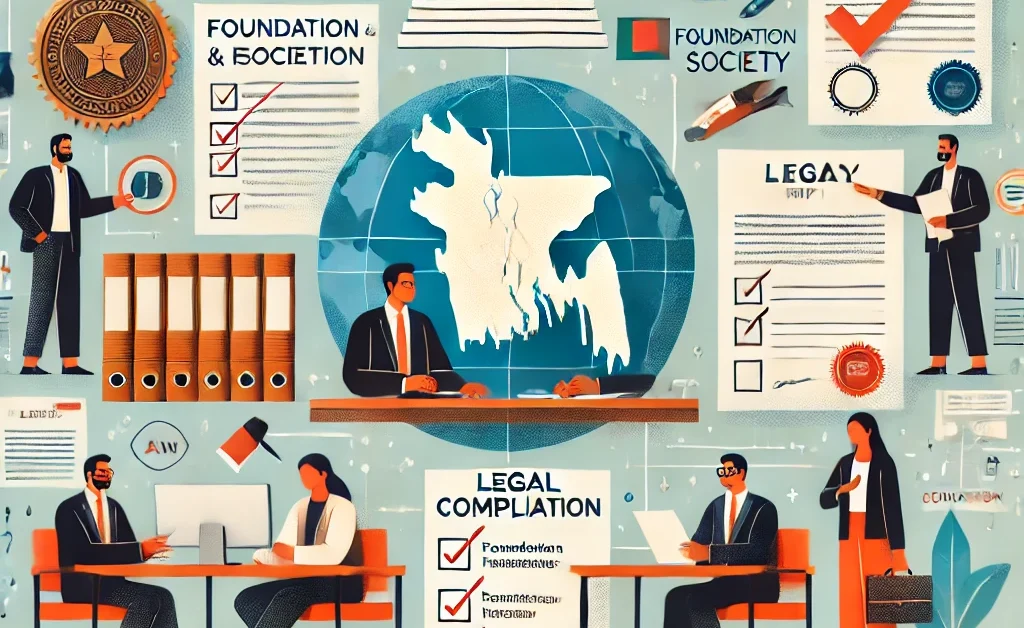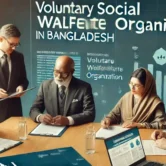Foundation and Society Registration in Bangladesh: Laws, Process, and Compliance

A Foundation or Society in Bangladesh is a non profit organisation incorporated to promote charitable, social, religious, cultural, educational or scientific purposes. These organizations operate within a legal framework that provides transparency, accountability, and adherence to regulatory standards.
For instance, a society is typically established for the promotion of charitable purposes, such as education, healthcare, and poverty alleviation. A society is governed by a set of by-laws and has a governing body that is responsible for the management of the organization.
Whereas, a foundation is also a non-profit organization that is established for the purpose of philanthropy, such as funding charitable causes, research, or education.
An association is a non-profit organization that is established for the promotion of a particular profession, trade, or interest.
Types of Non-Profit Organizations in Bangladesh
There are three major types of non-profit organization structures in Bangladesh, along with several other options for registering a non-profit or a social business:
- NGO or NGO Registration – Registered under the NGO Affairs Bureau
- Foundation, Society, and Association, – under the Societies Registration Act
- Non-Profit Company – Registered under the Companies Act, 1994
- Trusts – Registered under the Trusts Act, 1882
- Voluntary Social Welfare Organization – under the Department of Social Welfare
- Waqf – Registered under Waqf laws
- Cooperative Society – Registered under the Cooperative Societies Act
Find the right business structure in Bangladesh: from sole proprietorship to limited company, with our registration guide.

Key Characteristics of the Society/Foundation
- Non-Profit Nature – A society or foundation must not work for profits and must reinvest any financial surplus from its activities to itself.
- Legal Identity – Registration gives the organization a separate legal identity.
- Perpetual Succession — The organization shall continue to exist even when the founding members change.
- Liability – Members are not personally responsible for the society’s debts.
- Regulation & Supervision – Relevant authorities will apply the laws strictly to ensure the accountability and transparency of the usage of the funds.
- Recognition & Credibility – Builds trust and opens pathways to grants, donations, and tax benefits.
Foundation or Society Registration Process:
Society and Foundation registration in Bangladesh have the same registration process under the same laws.
- Relevant Authority: Registrar of Joint Stock Companies and Firms (RJSC), Website: http://www.roc.gov.bd/
- Governing Law: Societies Registration Act, 1860
- Ministry: Ministry of Commerce
- Name Clearance: Obtain name approval from the Registrar of Joint Stock Companies And Firms [RJSC]. In order to get approval for “Name Clearance” you must follow the RSJC name approval guidelines. Nonetheless, choose names for your non-profit organization that are unique, not resembled with any organization, and not already registered with the Registrar of Joint Stock Companies and Firms.
- Draft and Develop a constitution:
You need a constitution that outlines the purpose and objectives of the non-profit organization. Nonetheless, the Memorandum of Association (MoA) and Articles of Association (AoA) should include:
i. Membership Details:
- Types of membership (e.g., general members, executive members, honorary members).
- Eligibility criteria for membership.
- Membership fees, rights, and obligations.
- Process for resignation or termination of membership.
ii. Governance & Management Structure:
- Roles and responsibilities of Office Bearers (President, Secretary, Treasurer, etc.).
- Election process for the Governing Body/Executive Committee.
- Term limits for governing body members.
- Powers and decision-making authority of the governing body.
iii. Financial Management & Reporting:
- Appointment and roles of the Treasurer.
- Audit & Financial Oversight – Appointment of an independent auditor and frequency of audits.
- Guidelines on donations, grants, and fund utilization.
- Financial year and annual reporting obligations.
iv. Meetings & Decision-Making Procedures:
- Frequency of Executive Committee meetings and General Meetings (AGM/EGM).
- Quorum requirements for decision-making.
- Voting rights and dispute resolution mechanisms.
v. Amendments & Dissolution:
- Process for amending the constitution or articles.
- Conditions under which the organization may be dissolved, and how assets will be distributed in such a case (e.g., transferred to another non-profit with similar objectives).
LegalBD can create your constitution legally robust, clear, and transparent. Let us know if you need a sample constitution template!
- Application Submission: Once the constitution is drafted, the non-profit organization must be registered with the Registrar of Joint Stock Companies and Firms. The registration process requires the submission of a number of documents, including the constitution, a list of the governing body members (at least seven executive members), and the address of the non-profit organization.
- Fee Payment: Government registration fees must be paid.
- Verification: Authorities go through Verification in order to ensure accuracy, legitimacy, and compliance with legal requirements by examining the submitted documents, including: i. Memorandum of Association (MOA), ii. Constitution, iii. Activity reports, iv. Financial statements, v. Lists of executive committee members. Etc.
- Security Checks: The Law enforcement agencies, preferably the National Security Intelligence (NSI) and the Special Branch of Police, should conduct security checks. These checks may involve:
- Verification of the personal and professional backgrounds of executive committee members.
- Criminal records check.
- Verification of the address and activities of the organization.
- Routine check by way of Field Inspections:
- on-site inspections for the verification of the organization’s operational capacity and the reality of the activities declared.
- Financial activities and its verification.
- Please note that – Verification of financial records is taken seriously in all cases, to ensure transparency, proper fund handling, and especially when foreign donations are involved.
- Approval and Issuance of Registration: Authorities verify documents and conduct security checks, and upon approval, RJSC registers the society.
- Timeframe: Approximately 1-3 months.
Post-Registration Process
A. Obtain a Trade License: Compulsory on any commercial activity. You can obtain a trade license from the Local City Corporation or Municipality, Union Parishad, etc.
B. Open a Bank Account
You will use the registration certificate to open a bank account in the name of the organization.
This account will apply to donations, expenses, and grants.
C. Tax Exemption & Compliance
File an application with the NBR for income tax exemption as per the Income Tax Ordinance, 1984.
D. Approval of Agency of the NGO Affairs Bureau (for foreign funds)
If your organization take donations from outside the country must register with the NGO Affairs Bureau.
E. Annual Reporting & Compliance
- Filing of annual audited financial statements with RJSC.
- Conduct Annual General Meetings (AGM) according to the society’s constitution.
- Notify RJSC for any changes in the Executive Committee.
FAQ on Foundation or Society in Bangladesh
Q1: How long does it take to register?
This process typically takes 4 to 8 weeks depending on document verification and approval.
Q2: Is it possible for a foreign national to be a founding member?
Yes, there is no specific bar for a foreign national to become a founding member in the organization. But there Bangladeshi citizen in the Executive Committee.
Q3: Do I have to register a foundation or society?
Not, but registration provides legal status, improves credibility and enables fundraising.
Q4: What are some of the reasons for rejection?
- Existing organization name conflict.
- Insufficient or invalid documentation.
- Not Pursuant to the Societies Registration Act, 1860.
Q5: Can a society own property?
Yes, A registered society can hold any property, can make contracts, can sue and can also be sued in its name.
Q6: What if we want to change the Executive Committee?
RJSC must be informed of any changes and the changes should be included in the annual returns.
Q7: What if we want to dissolve the society?
Special resolution, court order, and RJSC approval.
✅ LegalBD is happy to draft your registration documents, manage your registration, and provide ongoing maintenance for your Co-operative Societies. Contact us for more details.







